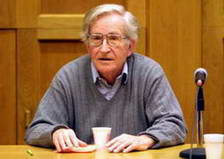Атеизм
Учебка
Портретная галерея
Персоналии
Знаменитые атеисты
FAQ по атеизму
Архив сайта
Обновления
О Сайте
Ссылки
Гостевая книга
Американский лингвист, основоположник теории порождающей (генеративной) грамматики; агностик.
|
"Do I believe in God? Can't answer, I'm afraid. I'm not being flippant, but I don't understand the question. What is it that I am supposed to believe or not believe in? Are you asking whether I believe there is something not in the universe (or the universes, if there are (maybe infinitely) many of them), and that somehow stands above them? I've never heard of any reason for believing that. Something else? What. There are many concepts of spirituality, among them, various notions of divinity developed in the Judaeo-Christian-Islamic religions. Within these the concepts vary greatly. St. Augustine and others, for example, argued that one should not take seriously the Biblical account of God as an exaggerated human, and other Biblical accounts, because they were crafted so as to make the intended message intelligible to humans-and on such grounds, he argued, organized religion ought to accept persuasive conclusions of science, a conception that Galileo appealed to (in vain) when he faced Papal censure. Anyway, without clarification of a kind I have never seen, I don't know whether I believe or don't believe in whatever a questioner has in mind. I don't see how one can "believe in organized religion." What does it mean to believe in an organization? One can join it, support it, oppose it, accept its doctrines or reject them. There are many kinds of organized religion. People associate themselves with some of them, or not, for all sorts of reasons, maybe belief in some of their doctrines. Who wrote the Bible? Current scholarship, to my knowledge, assumes that the material that constitutes the Old Testament was put together from various oral and folk traditions (many of them going far back) in the Hellenistic period. That was one of several currents, of which the collection that formed the New Testament was another. Biblical archaeology was developed early in this century in an effort to substantiate the authenticity of the Biblical account. It's by now generally recognized in Biblical scholarship that [I]t has done the opposite. The Bible is not a historical text, and has only vague resemblances to what took place, as far as can be reconstructed. For example, whether Israel ever existed is not clear; if so, it was probably a small kingdom somewhere in the hills, apparently virtually unknown to the Egyptians. That's my understanding, from casual reading; I haven't followed recent work closely. Importance, relevance, historical-social impact? These are enormous questions. I can't try to address them at this level of generality; it requires at least an article, better a book or many books. Elements of the Christian fundamentalist right are one of the strongest components of "support for Israel"-support in a odd sense, because they presumably want to see it destroyed in a cosmic battle at Armageddon, after which all the proper souls will ascend to heaven-or so I understand, again, not from close reading. They have provided enormous economic aid, again of a dubious sort. One of their goals seems to be to rebuild the Temple, which means destroying the Al-Aqsa Mosque, which presumably means war with the Arab world-one of the goals, perhaps, in fulfilling the prophecy of Armageddon. So they strongly support Israeli power and expansionism, and help fund it and lobby for it; but they also support actions that are very harmful and objectionable to most of its population-as do Jewish fundamentalist groups, mostly rooted in the US, which, after all, is one of the most extreme religious fundamentalist societies in the world." That "religion is inherently irrational" is surely
true. Why one set of beliefs that are offered without argument or
evidence rather than another? On the claim that "religion will die out
in the next few hundred years unless it incorporates science for its
explanation for cosmological events of the universe," possibly that
is correct, if you mean organized religion (the Church in Rome,
for example), but then they've moved in that direction long ago. As
for religion being "a part of every observable society," if what is
meant is that every society we know has sought to find some explanation
for matters of deep human concern that we do not begin to understand
(death, the origins of the universe, etc.), that's doubtless true.
If one wants to call the constructs developed "religion," OK.
I don't see what that implies, apart from the fact -- I presume
it is a fact -- that people seek answers to hard questions, and
where understanding reaches limits (very quickly, in most areas),
they speculate, construct myths, etc. To draw conclusions about
"human nature" from historical constructs of dominant societies in
the past few thousand years seems to me quite a stretch. On
"submission to an authoritarian God," that's part of some belief
systems, not others. As for monotheism, I think a strong case can
be made that that's not to be found in the Old Testament, pre-Babylonian
exile, and may well have its roots in non-Semitic cultures, as often
argued. On the divinity "allowing suffering to exist," there's a vast
literature. As for "our model of god," we can "revamp" it if we have
one. Not having one, I can't revamp it, or suggest how others should.
On religion in an anarchistic society, I would agree with the classic
anarchist slogan "Ni Dieu, ni Maitre" (No god, no master). I don't
see the justification for either, but individuals make their own
choices, just as I make mine. http://www.zmag.org/chomsky/other/chomchatarch.htm "You can see that in the polls too. I was just looking
at a study by an American sociologist (published in England) of
comparative religious attitudes in various countries. The figures are
shocking. Three quarters of the American population literally believe
in religious miracles. The numbers who believe in the devil, in
resurrection, in God doing this and that -- it's astonishing. These
numbers aren't duplicated anywhere else in the industrial world. You'd
have to maybe go to mosques in Iran or do a poll among old ladies in
Sicily to get numbers like this. Yet this is the American population." "The Bible is probably the most genocidal book ever
written." |


